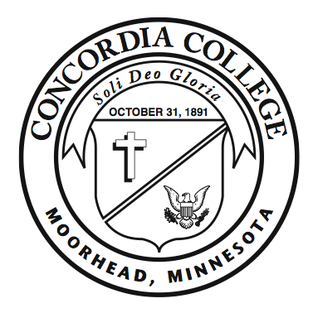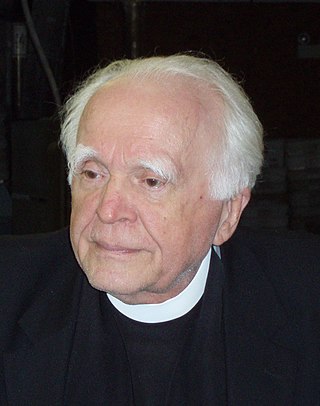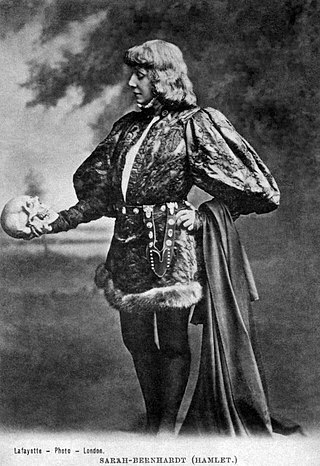Related Research Articles

Paul Johannes Tillich was a German-American Christian existentialist philosopher, religious socialist, and Lutheran theologian who was one of the most influential theologians of the twentieth century. Tillich taught at German universities before immigrating to the United States in 1933, where he taught at Union Theological Seminary, Harvard University, and the University of Chicago.

Concordia Theological Seminary is a Lutheran seminary in Fort Wayne, Indiana. It offers professional, master's degrees, and doctoral degrees affiliated with training clergy and deaconesses for the Lutheran Church–Missouri Synod (LCMS).
Fictitious or fake entries are deliberately incorrect entries in reference works such as dictionaries, encyclopedias, maps, and directories, added by the editors as copyright traps to reveal subsequent plagiarism or copyright infringement. There are more specific terms for particular kinds of fictitious entry, such as Mountweazel, trap street, paper town, phantom settlement, and nihilartikel.

Concordia Seminary is a Lutheran seminary in Clayton, Missouri. The institution's primary mission is to train pastors, deaconesses, missionaries, chaplains, and church leaders for the Lutheran Church–Missouri Synod (LCMS). Founded in 1839, the seminary initially resided in Perry County, Missouri. In 1849, it was moved to St. Louis, and in 1926, the current campus was built.

Concordia College is a private liberal arts college in Moorhead, Minnesota. Founded by Norwegian settlers in 1891, the school is associated with the Evangelical Lutheran Church in America and is unrelated to the Concordia University System operated by the Lutheran Church – Missouri Synod. Concordia is accredited by the Higher Learning Commission and has a total student enrollment of 1,800. It offers Bachelor of Arts, Bachelor of Music, Bachelor of Science in Nursing, Master of Education, and Master of Science, and Master of Music Education degrees.

Luther College is a private Lutheran liberal arts college in Decorah, Iowa. Established as a Lutheran seminary in 1861 by Norwegian immigrants, the school today is an institution of the Evangelical Lutheran Church in America. The upper campus was listed as the Luther College Campus Historic District on the National Register of Historic Places in 2021.

Concordia University Wisconsin (CUW) is a private Lutheran university in Mequon, Wisconsin, United States. It is part of the Concordia University System operated by the Lutheran Church–Missouri Synod (LCMS). The university is organized into six constituent schools in arts and science, business, education, health professions, nursing, and pharmacy. The university had an enrollment of about 5,000 undergraduate and graduate students in 2022. It is accredited by the Higher Learning Commission.

Martin Emil Marty is an American Lutheran religious scholar who has written extensively on religion in the United States.

Stanley L. Jaki was a Hungarian-born priest of the Benedictine order. From 1975 to his death, he was Distinguished University Professor at Seton Hall University, in South Orange, New Jersey.

Concordia University Texas is a private university in Austin, Texas. The university offers undergraduate, graduate, and online degrees as well as an adult degree program for part-time and returning students.

Luis de Molina was a Spanish Jesuit Catholic priest, jurist, economist and theologian renowned for his contributions to philosophy and economics within the framework of the second scholasticism.
The University of Chicago Divinity School is a graduate institution at the University of Chicago dedicated to the training of academics and clergy across religious boundaries. Formed under Baptist auspices, the school today is without any sectarian affiliation.
Lutheran orthodoxy was an era in the history of Lutheranism, which began in 1580 from the writing of the Book of Concord and ended at the Age of Enlightenment. Lutheran orthodoxy was paralleled by similar eras in Calvinism and tridentine Roman Catholicism after the Counter-Reformation.

René Clausen is an American composer, former conductor emeritus of The Concordia Choir, and former professor of music at Concordia College in Moorhead, Minnesota. Some of his works are widely performed by high school and church choirs, and his more technically demanding pieces have been performed and recorded by college and professional choirs. His recording "Life & Breath: Choral Works by René Clausen" received three Grammy Awards at the 55th Grammy Awards in 2013.

Martin Luther was a German priest, theologian, author, hymnwriter, professor, and Augustinian friar. Luther was the seminal figure of the Protestant Reformation, and his theological beliefs form the basis of Lutheranism. He is widely regarded as one of the most influential figures in Western and Christian history.
Robert Kolb is Distinguished Professor and Research Fellow at Christ School of Theology at the Institute of Lutheran Theology, professor emeritus of Systematic Theology at Concordia Seminary, St. Louis, Missouri, and a world-renowned authority on Martin Luther and the history of the Reformation.
In literature, the paradox is an anomalous juxtaposition of incongruous ideas for the sake of striking exposition or unexpected insight. It functions as a method of literary composition and analysis that involves examining apparently contradictory statements and drawing conclusions either to reconcile them or to explain their presence.

The paradox of fiction, or the paradox of emotional response to fiction, is a philosophical dilemma that questions how people can experience strong emotions to fictional things. The primary question asked is the following: How are people moved by things which do not exist? The paradox draws upon a set of three premises that seem to be true prima facie but upon closer inspection produce a contradiction. Although the emotional experience of fictional things in general has been discussed in philosophy since Plato, the paradox was first suggested by Colin Radford and Michael Weston in their 1975 paper "How Can We Be Moved by the Fate of Anna Karenina?". Since Radford and Weston's original paper, they and others have continued the discussion by giving the problem slightly differing formulations and solutions.

Søren Kierkegaard was a Danish philosopher whose influence and reception varied widely and may be roughly divided into various chronological periods. Reactions were anything but uniform, and proponents of various ideologies attempted to appropriate his work quite early.
Public theology is the Christian engagement and dialogue within the church and especially with the larger society. It seeks the welfare of the state and a fair society for all by engaging issues of common interest to build the common good. This is Christian theology that talks with society not just to society. This is done by presenting a Christian position in a way that can be publicly understood and thereby open to public debate and critical enquiry.
References
- ↑ "Franz Bibfeldt: The Most Important Theologian You've Never Heard Of". Theoblogy. 2 November 2012. Retrieved 22 February 2018.
- 1 2 3 Easton, John (February 1995). "The Unbearable Lightness of Being Bibfeldt". The University of Chicago Magazine.
- 1 2 3 Teresi, Dick (March 28, 1999). "Is Franz Bibfeldt for Real? Yes and No". The New York Times. Retrieved 19 August 2012.